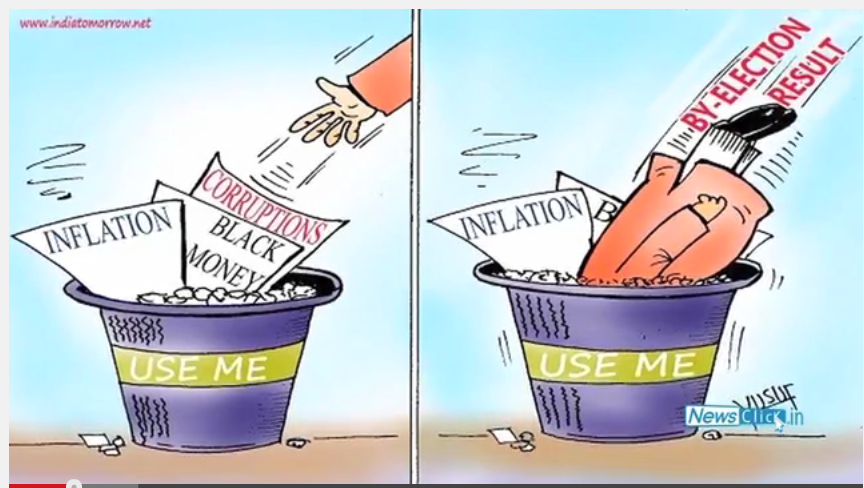Assembly Poll Results: Towards a One Party Monopoly?
In the recently concluded assembly elections, the BJP has emerged as the single largest party in Maharashtra and won the majority of seats in Haryana. These results are very different from the bypoll results where the BJP suffered losses in Rajasthan, Gujarat, Bihar and Uttar Pradesh. The results raise a fresh set of questions: what are the reasons behind this victory? Is the “Modi wave” still effective? Are regional parties close to extinction? Newsclick discussed these and other questions with Shankar Raghuraman, Associate Editor in The Times of India.

Rough Transcript:
Pranjal Pandey (PP)- Hello and welcome to Newsclick. Today we have with us, Shankar Raghuraman, who is Associate Editor in The Times of India. Today we are going to discuss recently concluded assembly polls of Maharashtra and Haryana, where in Maharashtra, BJP has emerged as single largest party, while in Haryana, it has got a clear majority.
Hello Shankar, my first question is that recently we saw BJP loosing in by polls and the message was that Modi wave is over. How do you see these election results? And what implication does it leave at the national level?
Shankar Raghuraman (SR)- See, when the by elections were held over the last few months, a lot of people drew the conclusion from that, that the so called Modi wave is over and it's back to the normal political situation. It is always very dangerous to confuse by elections with general elections because in by elections the party which is in power, which is running the government, tends to have an advantage because many voters think that it doesn't make sense to weaken a government which is already in power. And since you aren't going to change the government through a by-election, it makes sense to strengthen them further. And therefore, one has to be very vary of too much into the outcome of a by-election. As far as the elections in Maharashtra and Haryana are concerned, it is now quite apparent that the anger against the Congress, the UPA, which was witnessed in the 2014 Lok Sabha elections has continued It has not yet gone away, people are still very angry with what they perceive as inefficient corrupt governments and that like in the Lok Sabha, it is a combination of some amount of hope from Mr. Modi and a lot of anger with the Congress which has delivered this kind of outcome for the BJP in Maharashtra and Haryana. Of course, for the BJP, it's a truly big achievement because in both these states, both in Maharashtra and in Haryana, it had never formed a government on its own. Today it is in a position to form the government. Today, it has formed the government in Haryana on on its own, and in Maharashtra it's quite clear, though it hasn't got a majority its quite clear that it will lead, whatever government is formed. So, from the BJP's point of view, this is far better outcome than any thing they could have expected.
PP: leadership claims that regional parties are near to extinction while on the other hand, Congress is nowhere near to revival. Do you think BJP will be the only national party that will remain in power in coming years?
SR: See this kind of statement to the effect that regional parties are a thing of the past that they will now gradually weaken and disappear is something we've been hearing for close to 2 decades now. Ever since the era of coalition politics began, both the BJP and Congress like to say this kind of a thing because they would genuinely like to believe that India will become a bipolar polity with a straight contest between BJP and Congress or at best a coalition led by Congress versus a coalition led by BJP. But the reality is, if you look at the election outcomes over the last 2 decades, is that quite the contrary is happening. Regional parties have not only survived they have grown stronger over time and there is nothing that has happened in the recent past which indicates that the trend is going to change. In fact, if you look at the Lok Sabha elections, the places where the so called Modi wave was comprehensively halted were all in areas where regional parties were strong. Whether it was ADMK in Tamil Nadu or the Biju Janata Dal in Orissa, or the Trinamool Congress in Bengal, it was when they came up against strong regional parties, that the BJP wave was halted. So, I see no reason to... I mean, Mr. Shah may be very hopeful on this count but I see no reason to take his prognosis very seriously.
PP: BJP leadership claims do you think BJP will really be able to make in roads to Bihar and in West Bengal?
SR: See, I think, Bengal and Bihar will prove far tougher nuts to crack for the BJP than Maharashtra or Haryana. One key difference is that in both in Haryana and in Maharashtra, it was either a Congress government or Congress led government. So there was a lot of incumbency sentiment about...you know, a spill over partly from the center, the fact that in a period of high inflation, low job creation, both the state and the central government were run by the Congress, created a sort of anger against the Congress and that doesn't hold true in the case of Bengal or Bihar in the same way. And in fact , you know Tamil Nadu is another state which the BJP has indicated little target in the future. In all these places, I think, they'll find it far far tougher in Bengal they have not historically had a strong base, in Bihar, they've had some presence and that
presence has increased over time, starting essentially with the JP movement but there is a very strong formidable alliance there between the JDU, the RJD and the Congress which we saw in the by-elections, is not to be taken lightly. So, I don't think it will be that easy for the BJP to form the government in Bihar on its own or in Bengal. In both these places, I think, they'll find the going much tougher than they have so far.
PP: Shankar, my last question to you is that whether the BJP will be able to repeat its Lok Sabha performance in coming assembly polls in Uttar Pradesh or will it be only regional parties like BSP or SP that will retain power?
SR: See, in UP, the BJP has one advantage which they had in Lok Sabha elections as well as in the recent state assembly elections in Maharashtra and Haryana which is that the government which is currently in power in UP, the Akhilesh Yadav government is seen as having failed to deliver on the promises on which it had been elected to power. There is a general perception that there is complete lawlessness in UP and it's a complaint which has always tended to dog the government of Samajwadi Party. It was expected that be different this time but again, there is the complaint of lawlessness. So to that extent, the BJP has an advantage. It also has the advantage of the fact that there have been several incidents of communal violence and generally increased communal tensions in UP, all of which it has exploited to the hilt including through the campaigns like Love-jihaad and so on, and finally, the third important factor is that the BSP seems to have got weakened, partly because of the communalisation of the polity. Given these factors, it would certainly appear that the BJP will do much better than it did in the assembly elections of 2012. However, it will be able to repeat the performance of the 2014 Lok Sabha elections, it remains doubtful. A lot will also depend on how Mayawati is able to revive the BSP, there is still a lot of time for the UP assembly elections, I mean, we are in 2014, the assembly elections are in 2017 and 3 years is a very long time in politics. I mean, if 3 years back if I had told you that BJP would be forming a government on its own in Haryana or would be the leading party in Maharashtra, you'd probably have laughed at me. So, it is somewhat foolhardy to look that far into the future, in politics. Let's just say that as things stand, the BJP looks to be on a good wicket in UP and perhaps, it could even strengthen that position in the coming 3 years, but equally, it could go back to where it started from.
PP: Thank you Shankar for talking to us. We'll be coming back to you regularly on such issues. Thank you.
Get the latest reports & analysis with people's perspective on Protests, movements & deep analytical videos, discussions of the current affairs in your Telegram app. Subscribe to NewsClick's Telegram channel & get Real-Time updates on stories, as they get published on our website.
























